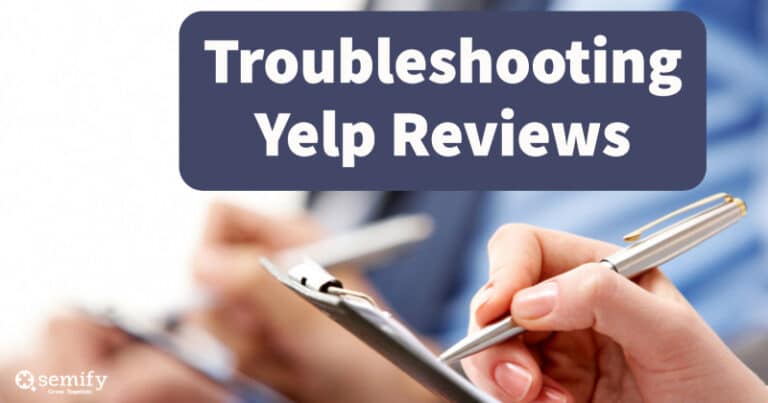
Table of Contents
- Do You Really Need Yelp Reviews?
- How to Address Bad Yelp Reviews
- How to Fix Disappearing Yelp Reviews
- Yelp Matters, But It’s Not the Only Review Platform
Yelp is a ubiquitous resource in 2022. While it won’t ever replace Google, it’s a platform that customers undoubtedly rely on to find out more about your business.
When leveraged correctly, your Yelp listing can boost brand awareness and off-site SEO. But this popular site can also come with certain frustrations.
We’ll discuss some of those frustrations in today’s post, as well as provide some solutions that can improve your perception of Yelp and its role in your online presence.
Do You Really Need Yelp Reviews?
Online reviews are critical in our digital world. Recent data shows that customers value online reviews from total strangers just as much as they do personal recommendations from friends and family.
In fact, research found that 72% of consumers trust Yelp and personal recommendations equally.
Generally speaking, reviews have become especially important thanks to the pandemic. According to ReviewTrackers, review interactions have increased by 50% compared to pre-COVID levels.
That means more web users are searching for, filtering, or expanding reviews than ever before.
When it comes to the businesses we choose to support, many of us are being more mindful. We may want to know whether a business is following public health and safety recommendations before we make the trip.
We might also want to know where a brand stands on a political or social justice issue prior to making a purchase.
Online reviews can reveal what a business may not be inclined to publicly proclaim. They’re seen as more trustworthy than testimonials or marketing copy – and for good reason. They provide us with an opportunity to try before we buy.
While we know that one person’s experience won’t necessarily reflect our own, online reviews can provide the vote of confidence we’re looking for. Alternatively, they can dissuade us from supporting a brand with values that fail to align with our own.
So with that in mind, does your agency (or do your clients) really need Yelp reviews?
Generally speaking, the answer is yes.
Online reviews are necessary – and we know that they mainly come from four online platforms.
Google reviews are number one, but Yelp is still the second most popular site that consumers check before visiting a physical business location.
Since Yelp is viewed as a trusted platform by web users, it’s important for business owners to manage their reputation online and to make a concerted effort to make a positive impression.
That being said, Yelp can present some… unique challenges for your brand.
Although Yelp is meant to heighten your online visibility, it can sometimes have the opposite effect.
It’s a useful platform when it works the way it’s supposed to. But you may find yourself getting frustrated when Yelp doesn’t seem to be on your side.
We’ve even experienced some of these issues ourselves. And while we don’t pretend to have all the answers, we’ve learned some tips that have helped – and we’re happy to pass them onto you.
With that in mind, let’s troubleshoot some of the most prevalent problems that businesses face on Yelp.
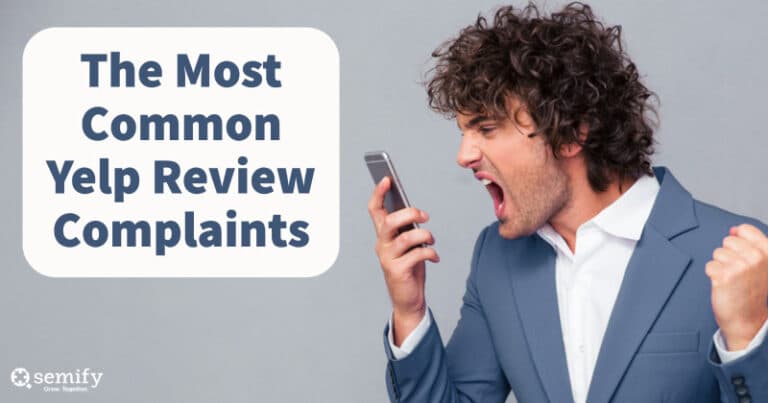
The Most Common Yelp Review Complaints
All it takes is a simple Google search to realize a lot of folks have a bone to pick with Yelp.
Frequently asked questions include “why did my Yelp review disappear?” and “how can I minimize bad Yelp reviews?”
Some of these issues are pretty much universal across online review platforms. But others are specific to Yelp – and they can really put a damper on your reputation management strategy.
Below, we’ve outlined a few of the most common Yelp-related complaints (including ones we’ve made ourselves!). How many of these have you or your clients experienced?
Bad Yelp Reviews
Negative reviews are, unfortunately, inescapable.
No matter how much you focus on customer service and employee satisfaction, there’ll eventually be someone who would rate their experience as substandard.
Sometimes, these reviews are warranted. In other cases, they may be totally uncalled for.
But either way, they probably won’t be going anywhere once they’re on Yelp.
Why?
Because Yelp makes it notoriously difficult for businesses to get reviews removed – even if they’re not completely true.
In some situations, you may be able to appeal to Yelp for a review removal. However, we wouldn’t recommend relying on that tactic.
Yelp has proven to remain “neutral” at all costs, which actually means the business being reviewed will often lose out.
That said, there are still some steps you can take when learning how to minimize bad Yelp reviews for your brand.
How Do I Minimize Damage From Negative Yelp Reviews?
Try to Get the Review Removed
When learning how to minimize bad Yelp reviews, your first instinct might be to delete the review in question. Yelp doesn’t allow you to hide or delete your own reviews at-will, nor will they take action if the review merely contains some harsh words you don’t want to hear.
But it actually goes beyond that. Inaccurate reviews may stay up indefinitely, too.
Even if the review represents an incident that never took place, Yelp won’t take sides in “factual disputes.” This means you’ll be stuck if you receive a review that’s filled with lies about your business. Not ideal.
However, you do have some recourse if the review violates Yelp’s own content guidelines.
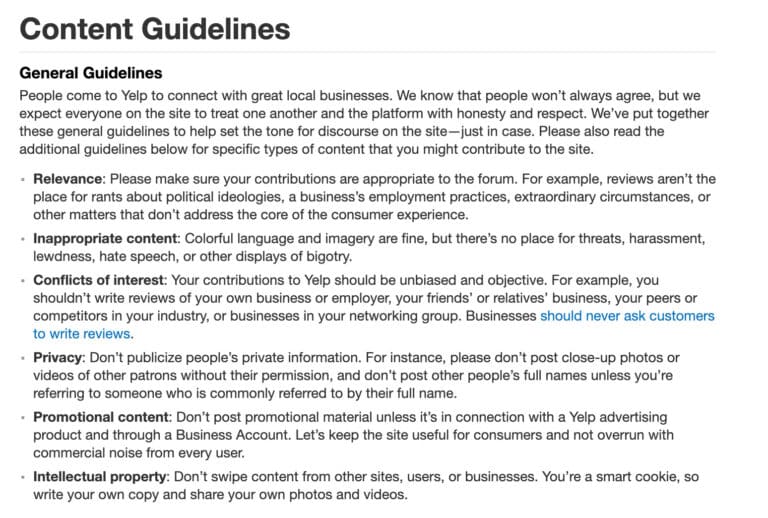
In particular, Yelp says that reviews that…
- Are irrelevant to the forum or consumer experience
- Contain inappropriate language like threats, harassment, bigotry, hate speech, or lewdness
- Include a conflict of interest (e.g., businesses writing their own reviews or any reviews from/for friends, family, competitors, peers, employees)
- Violate the privacy of others (including doxxing of personal info or visual media obtained without permission of other patrons)
- Are promotional in nature (excluding official Yelp advertising through a business account) or
- Feature duplicate content or other intellectual property violations
…can be removed from the platform. But there are still no guarantees that the review will be deleted, since guideline violations can often be subjective.
Below, Yelp outlines the three main reasons they’re likely to remove a review. Arguably, you’d have the best luck removing removes that contain the following:
- Conflict of Interest – A review can be removed if it’s made by a competitor or former employee; if it’s somehow affiliated with the business being reviewed; if it’s promoting the business or a competitor of the business; or if the reviewer is receiving some type of payment or incentive for sharing their feedback.
- Irrelevant Experiences – Yelp cites that a review that focuses on another person’s experience or disputes another review on the platform can be removed. The same goes for reviews focused on a totally different business or those that appear to be plagiarized from another site. Finally, Yelp may also take the step to remove reviews outlining “extraordinary circumstances,” which could include content related to political beliefs, the COVID-19 pandemic, or stories that are playing out in the media.
- Inappropriate Content – The platform does take a stance against reviews that contain hateful and inappropriate language, including threats, harassment, hate speech, private information, and lewd comments.
If you do receive a review that violates Yelp’s content guidelines, the platform encourages you to report the review.
Remember: just because you find something to be offensive doesn’t always mean that Yelp will agree. But if it’s more than just a difference of opinion or perception, you may be able to appeal to the Powers That Be.
Respond to the Review With Grace
Keep in mind that the vast majority of negative reviews won’t violate Yelp’s content guidelines. In most cases, the feedback will be negative or even biased – but it won’t be objectively and overwhelmingly harmful without cause.
So what should you do when you receive a negative review on Yelp that can’t be reported?
Respond with compassion and be smart about what you say.
We’ve explored how to respond to negative reviews for your business in the past. (If you haven’t read our post or need a refresher, we encourage you to take a look before you do anything else!)
But in case you’re short on time, here are the basics on how to properly respond to negative reviews on Yelp and elsewhere:
- Respond within 24 to 48 hours
- Don’t panic or let your emotions get the best of you
- Thank the customer for sharing their thoughts
- Acknowledge where you came up short
- Apologize when appropriate
- Be empathetic and show you care
- Make things right (online and off)
This review management checklist can keep you from taking reviews too personally while still being accountable to customer feedback.
Now, keep in mind that bad reviews aren’t always bad.
In some ways, they can actually provide you with new, awesome opportunities to highlight the strengths of your brand and your people.
More often than not, those who seek out online reviews will care more about how you respond than the negative review itself.
You can showcase your dedication to customer service, your willingness to grow and improve, and your integrity as a business owner by learning how to minimize bad Yelp reviews with a thoughtful response.
Try Reputation Management SEO
Although this shouldn’t be right at the top of your list, it may be worth trying if you’ve exhausted your other options.
If you know that your Yelp reviews are skewed unfairly and they’re impacting your ability to reach new customers, you could use SEO in an attempt to “push down” your Yelp reviews page in search results.
This won’t make your negative Yelp reviews disappear, but it can lessen their impact.
The idea is to get other pages to rank on your brand name (or on “[brand name] reviews”) earlier on page 1 of SERPs than Yelp does.
While this isn’t easy to accomplish, you could try…
- Setting up social media accounts for your brand to dominate page one
- Generate reviews on other platforms (more on that later)
- Publishing press releases for your brand
- Secure a profile on an industry comparison site
- Make full use of Google Business Profile
- Get some positive media mentions from news outlets (e.g., community contributions, not sponsored content)
Regardless of the reviews you receive, reputation management can be a worthwhile endeavor. You may not manage to outrank your own Yelp review page, but these efforts should still be part of your strategy no matter what.
Encourage Others to Leave a Review
Another way to manage your online reputation is to learn how to get more Yelp reviews to balance out the negative ones you receive.
In previous posts, we recommended that you simply ask your customers to leave you an online review. However, that tactic isn’t recommended for Yelp.
Even though Yelp is lax when it comes to regulating and managing reviews, the platform is pretty harsh on business owners who want to request reviews from customers.
Surprisingly, asking for reviews isn’t on the checklist of how to get more Yelp reviews.
In fact, Yelp specifically prohibits this in its policies:

Basically, this means you should NOT:
- Request or ask outright for anyone to review your business on Yelp
- Offer any kind of incentive for posting Yelp reviews
That doesn’t mean you can’t learn how to get more Yelp reviews. You just need to do it without violating the platform’s policies.
Here are a few smart ways to subtly encourage customers to leave a review without explicitly asking them for one.
- Direct visitors to your Yelp page. Let them know they can check you out on Yelp, put up Yelp-branded signage around your place of business, or place a Yelp badge right on your website. This lets customers know you’re active on the platform without mentioning that you’d like a review from them. The implication may be enough.
- Create a Yelp check-in offer. This is a workaround that won’t violate the platform’s policies while still rewarding customers for being active on Yelp. You can give Yelp users a freebie or discount at a certain time, which makes your brand look generous and encourages new sales. While it might not necessarily lead to a review, it appeals to those who are already using the Yelp platform. And engaged Yelpers are more likely to leave positive feedback for businesses.
- Share positive reviews on social media. There’s nothing wrong with sharing reviews that customers have already left for you. In fact, this is a great way to leverage their feedback for content and build your brand presence. Sharing a rave on Facebook or Twitter can alert your audience that their words have a real impact on your business. This can nudge them to take action and leave a review if they haven’t already done so.
- Consider running a Yelp ad. Yelp’s advertising power is pretty undeniable. Not only do 82% of Yelp users intend to make a purchase, but a Harvard study found that small businesses that increase their Yelp rating by just one star can see revenue boosts of 5% to 9%. While Yelp’s advertising practices have often come under fire, it could be worthwhile to run an ad on the platform. Since business ads appear first, these can differentiate your business from the competition. Subsequently, you may receive more reviews from Yelp users who have turned into customers as a result of your ads.
Knowing how to get more Yelp reviews can be challenging when you can’t actually ask for them. But whether you don’t have enough Yelp reviews or you’re trying to counteract some negative feedback, you can rely on these techniques to improve your visibility without violating the platform’s strict policies.
Getting more reviews can seem like a great fix to these problems. But what happens when Yelp filters the reviews you receive for no apparent reason?
Disappearing Yelp Reviews
This is one of the most notable frustrations for us (and many others) with the Yelp platform.
Like many other services, Yelp uses an algorithm in an effort to create a better experience for users.
But Yelp’s algorithm is notoriously wide-reaching and (some would say) biased. While the goal might be to show honest reviews and hide those that could be solicited, the final result is sometimes seen as unfair.
Essentially, Yelp ends up filtering a good portion of reviews that the average business receives.
And that includes real reviews left by real customers.
We’ve encountered this issue ourselves many times. See an example for yourself below:
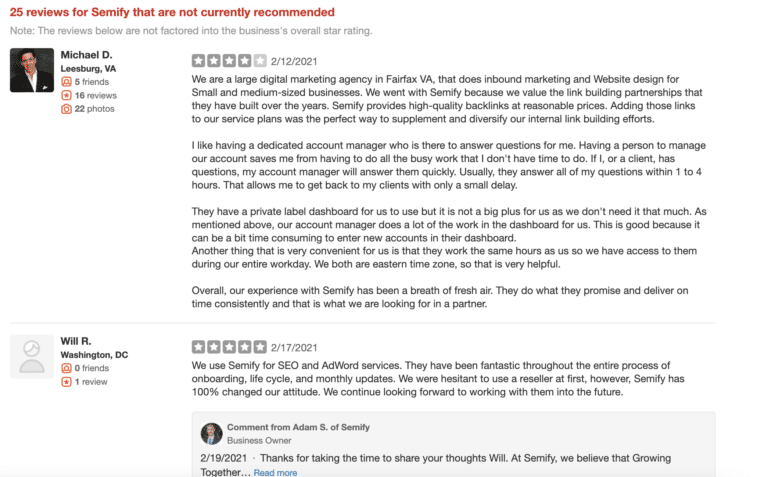
We have a staggering 25 Yelp reviews that are filtered as “not recommended.”
The kicker? None of these people were solicited to leave reviews or did anything inherently wrong in their reviews.
It’s not just our Semify reviews that have been filtered, either. Yelp is well aware of the problem and have even talked about it in their blog post explaining the platform’s recommendation software:
“Reviews that reflect perfectly legitimate experiences are sometimes unrecommended out by the recommendation software’s algorithmic processes. We agree this can be frustrating, but it’s the high cost we accept to avoid being a laissez-faire review site that people stop using. Everyone loses when that happens.”
Simply put, this means that Yelp is willing to have an algorithm that filters out real reviews. They view it as a necessity. There’s really no incentive for them to change this or even respond to appeals from business owners who are struggling to heighten their presence on the platform.
Yelp claims not to take sides in “factual disagreements,” but its recommendation software seems to be anything but neutral.
It’s a really unfortunate wrinkle that has admittedly caused us to focus on other review platforms besides Yelp. Google reviews and sites like clutch.co have yielded much better results for us (while still verifying review authenticity) and don’t seem to present these same problems with hiding legitimate reviews.
With that, you may be wondering: “Why did my Yelp review disappear for a business I support? And why are my customers’ reviews getting filtered out?”
Let’s take a closer look.
Why Do Yelp Reviews Disappear?
Firstly, there are a few valid reasons as to why Yelp reviews disappear. If the author deletes the review of their own volition or the review is removed by Yelp for content guideline violations, their feedback will vanish into thin air.
But generally speaking, those who are asking “why do Yelp reviews disappear?” are inquiring about filtered reviews that are considered to be “not recommended” by the platform.
You might think that the answer to the “why do Yelp reviews disappear” question is arbitrary. But there are actually some prevalent reasons why your reviews might be filtered by Yelp.
If you’re wondering “why did my Yelp review disappear?,” look for the following issues:
- The reviewer has published no other Yelp reviews
- The reviewer’s profile information is incomplete or missing
- The reviewer is located far from the business’s location
- The review has a lack of substance or details
- The review is overwhelmingly positive or negative
None of these details automatically indicate that a review is fake or solicited. If you were to travel somewhere on vacation and had a great experience, why should your review be seen as less authentic than that of a local’s?
The location issue is a big one for online businesses, in particular. Yelp tracks the reviewer’s IP address and can filter reviews based on proximity. But if most of your customers are located outside of your community (which is true for us!), you might be out of luck.
Yelp also wants to reward those who readily use their platform. While Yelp doesn’t want to take a side in factual disagreements, they seem to feel that known users are more reliable than one-time visitors. And although this could be true in some cases, it means that certain customer feedback will hold more weight than others.
Someone who is more active on Yelp is automatically seen as more trustworthy than someone who’s new to the platform. If a customer hasn’t integrated their social networking handles into their Yelp profile or they haven’t connected with friends on Yelp, their review of your business may be filtered and seen as “not recommended.”
That’s a tough pill to swallow and can severely limit whose voices can be heard.
But contrary to popular belief, these filtered reviews aren’t actually deleted.
So where do filtered reviews go?
What Happens to “Not Recommended” Reviews on Yelp?
You may know why your Yelp reviews disappeared (no matter how misguided the reason). But what happens when a review is filtered and deemed as “not recommended?”
In short, it disappears from your Yelp business page. Filtered reviews don’t show up because your business page shows only recommended reviews by default.
They aren’t gone without a trace, however. You can still view non-recommended reviews by clicking a specific link located at the bottom of your business page.
But those reviews aren’t included in your review count or your star rating. They’re extraneous information that usually won’t be viewed by Yelp users. Most people aren’t going to take that step.
Really, those “not recommended” Yelp reviews might as well not exist.
Although Yelp says it does re-evaluate filtered reviews and can reinstate reviews that are later found to be legitimate, you shouldn’t count on it.
What’s more, Yelp employees can’t override the recommendation software. So even if you try to appeal to a real human to get those reviews reinstated, it won’t do any good.
In the end, “not recommended” reviews on Yelp just… sit there in limbo. They’re usually sentenced to a lifetime in Review Purgatory.
But not all is lost. It’s a long shot, but there are a few things you can do to transform filtered reviews into recommended ones.
How to Unfilter Hidden Reviews on Yelp
Knowing the answer to the “why did my Yelp review disappear” question may not be quite as important as knowing how to unhide the reviews that Yelp doesn’t recommend.
There are no guarantees that these actions will yield positive results. But it doesn’t hurt to try the following:
- Engage with Yelp reviews immediately. Whether the feedback is positive or negative, don’t wait to reply. Focus on your online review management and thank the customer right away when a review comes in.
- Mark positive reviews as being “helpful” or “cool.” It may seem like a small adjustment, but it can be enough to sway Yelp’s algorithm. If your employees are active on Yelp, ask them to monitor reviews and tag the positive ones as being useful.
- Add the reviewer as a friend on Yelp. For whatever reason, Yelp seems to view itself as part networking site. If you add the reviewer as a friend in your network, this can convince the platform of the review’s legitimacy.
- Contact the reviewer. This is a big ask, but you can message the reviewer through Yelp and ask them to complete their profile, use the Yelp app, or get active with more reviews and check-ins. We’d recommend reserving this tactic for customers you’re personally familiar with, as it could backfire.
- Think about a post-review reward. You cannot incentivize someone to write a review for your business. But after the review has already been written, it’s technically fair game. If the review has been filtered out and there’s something the reviewer can do to legitimize their profile, you could make it worth their while by offering a gift card or discount to make those changes and make sure the review can be seen.
Additionally, you should also become familiar with how to potentially prevent reviews from becoming hidden in the first place.
Again, you can’t always control how Yelp’s algorithm will function. But to give your reviews the best chance of staying visible…
- Encourage customers to leave lengthier reviews that contain photos (they’re harder to fake!)
- Engage with all reviews that come in as soon as possible
- Don’t try to get an influx of reviews all at once
- Use different devices for customer reviews (Yelp tracks IP addresses)
- Get active on Yelp and encourage customers to do the same
With these tips in mind, you may be able to fight back against unjustly filtered reviews on Yelp.
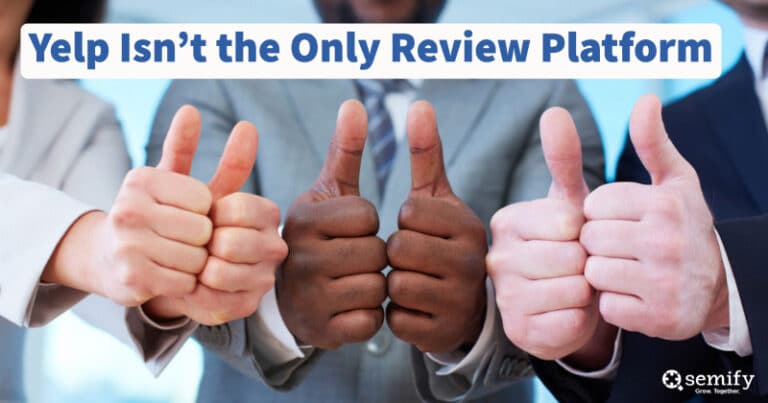
Yelp Matters, But It’s Not the Only Review Platform
Here’s the thing: Yelp may be popular, but it’s not the only review site out there.
It’s not even the most important one! Google wins out every time (as it often does).
Google reviews make up the largest portion of all online reviews. Around 73% of online reviews are distributed through Google, compared to Yelp’s 6%.
Data also shows that 63.6% of consumers say they’re likely to check Google reviews, through either search or Google Maps, before they visit a business. Only 45.18% of consumers say the same about checking Yelp prior to making a trip to a physical business location.
Google reviews are FAR more accessible than Yelp. Since most of us use Google as a default anyway, reviews there can often be viewed with zero clicks. You don’t have to navigate to a separate platform, sign into an account, or go through a lot of extra effort just to see feedback from other customers.
As a result, it may be a better use of your time to focus on optimizing your Google Business Profile and asking customers to leave you a review there instead.
And while Facebook makes up a smaller portion of online reviews, it’s still a good platform to highlight. If your customers are already active on Facebook, it’s not a bad idea to beef up your reviews there and make sure you’re truly active on social media.
Lastly, don’t overlook sites like clutch.co and Glassdoor. These sites have slightly different audiences than Yelp does, as Clutch is geared towards B2B relationships and Glassdoor is for employees and job seekers.
But you’d be surprised by how many of our customers say they looked at our reviews on these sites to get a feel for what it’s like to work with us. Even if your brand is B2C, customers may go to great lengths to get the real inside scoop.
(In case you missed it, check out our blog post on Glassdoor review management tips!)
While we don’t advise completely ignoring Yelp reviews, it’s important to remember they aren’t everything. There are other ways to acquire honest reviews for your business. So start exploring them!
Don’t Panic – Be Proactive
If you’ve been frantically searching for answers to your “why did my Yelp review disappear?” query or you’re worried about the impact of negative Yelp reviews, you’re definitely not alone.
That’s both a good thing and a bad thing.
Others are experiencing those same issues, so you’re not necessarily doing something wrong.
But it’s disheartening that Yelp seems unwilling to make changes that could help both business owners and consumers.
As it stands now, no one’s getting the full story.
Because of that, you’ll want to fill in the blanks wherever you can. Use Google Business Profile to the best of your ability, generate reviews on other sites, and always respond to the reviews you do receive.
If you play by the rules and make every effort to ensure your reviews are authentic, Yelp can’t get you down for long.